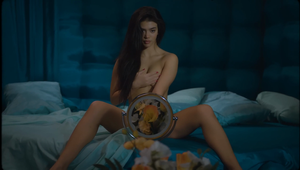
Seeing Through Amira’s Eyes: Leve Kühl on Directing a UN Refugee Film

When tasked with crafting a film for UNHCR’s ‘Hope Away from Home’ campaign, The Sweetstop director Leve Kühl aimed to strip away statistics and headlines, instead offering a deeply human perspective on the refugee experience.
Through the story of Amira, a fictional refugee whose journey encapsulates countless real-life stories, Leve sought to highlight resilience, humanity, and shared aspirations.
Speaking with LBB’s Olivia Atkins, he explains how creative trust, authentic storytelling, and collaboration shaped ‘Through My Eyes’, a film designed to spark empathy and redefine perceptions.
LBB> What was the initial brief from UNHCR and how did it shape your approach towards the film?
Leve> The team at UNHCR trusted us fully and gave us creative freedom to shape the story and concept. It’s rare to have that level of trust, and it made a huge difference. Their support and belief in the vision were what truly enabled us to create.
LBB> What inspired the decision to shoot the story from a refugee's perspective -- specifically through Amira’s eyes? And how did that make the storytelling more emotionally resonant?
Leve> It’s hard to overlook how polarised the conversation around refugees has become. Mainly it’s reduced to numbers, policies, and borders. And too often the actual people, who are at the heart of it all, are overlooked. That’s what inspired this project.
Safety is something we all deserve, yet for so many, it’s decided by nothing more than the place they are born. This film aims to portray refugees not as statistics, but rather as individuals with hopes, resilience, and talents that can enrich our communities.
LBB> The sound design features heavy breathing, background noise, and shouting. Tell me your thinking behind crafting these auditory details, and why they are significant to the story?
Leve> The sound design was an essential part of immersing the audience in the story. While the film is called ‘Through My Eyes’, we felt it was just as important to capture the experience through ears. It was less about perfection and more about honesty – recreating the raw, lived reality that the story demands.
POV doesn’t stop with where the camera is; it’s about creating a complete environment. Working with Thore Kühl and Ballad, we focused on building an auditory world that felt true to the story’s reality.
LBB> What research did you do to ensure the film's authenticity, and did any particular stories or firsthand accounts influence the production?
Leve> We approached the research with a lot of care, always prioritising safety. It was important to ensure no one’s well-being was jeopardised by sharing their story. That’s why the narrative draws from many experiences rather than just one. Listening to these voices was a humbling experience, and we tried to reflect their strength and resilience, while not sugar-coating the reality they face.
For this film, collaboration was key – I worked closely with people who had firsthand experience of displacement, both during pre-production and post-production, to ensure authenticity.
LBB> How collaboratively did UPPERFAST, The Sweetspot, and 27km contribute to the production? Were there any particular challenges or innovations that arose during the process?
Leve> The greatest challenge in telling this story was that it’s not one I’ve personally experienced. The awareness of who’s telling the story is as important as handling any logistical hurdle.
Even after extensive research and speaking to countless refugees in pre-production, I can’t even imagine what it must feel like to be one. So how could I speak for the millions seeking refuge? The truth is, I can’t.
But what I can do is to speak to people like me – people living in Europe or other regions who might feel disconnected from these stories or overwhelmed by the headlines. That’s where this film comes in. This isn’t about giving refugees a voice. They have voices. Rather, it’s about helping audiences like me to see beyond the label of a ‘refugee’. It is about seeing a mother, a daughter, a nurse, someone with dreams and fears, just like us. And while we may never fully understand someone else’s experience, perhaps the first step is trying to see the world through their eyes.
LBB> The film presents an emotional but empathetic viewpoint. Why did you decide to set this tone and how did you pull this out creatively and technically?
Leve> Sometimes, the most powerful step we can take is to listen. I didn't try to make anything up – I just wanted to reflect the reality that was already there.















